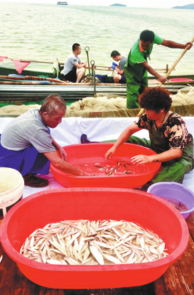'Taihu's pearl' shines anew
By Eric Nilsson | China Daily | Updated: 2018-12-18 07:20

The environmental crisis has, in some ways, proved a blessing in disguise. It compelled the government to support enterprises' transitions toward innovation.
Zhoutie township, for instance, was once known for its chemical industry.
As we strolled along Taihu's shore near his orchards, entrepreneur Zhang Tao told me the township hosted over 300 chemical companies in the early stage of the reform and opening-up.
"They were everywhere. But their success came at the expense of the environment," Zhang says.
"Only about a dozen still operate. Some are slated to also be shut down, which will further benefit our environmental recovery. Maybe we can soon swim … to cool down during the summer heat-something I did as a kid that we couldn't imagine a few years ago."
Zhang was an early mover to change his business' direction.
He'd left farming to enter the chemical industry and returned to agriculture-this time using green methods to cultivate fruit-a few years before the bloom.
"I made a lot of money in chemical production," he explained, as we plucked grapes that bejeweled his vines.
"But growing grapes brings in a lot of money, too. I feel good doing this because it's environmentally friendly."
Yet green agriculture is just one way in which Wuxi is innovating.
Many industries in the city are shifting toward such high-tech sectors as the internet of things.
I visited the China Business Innovation Center to find out how IoT technology is being used in healthcare.
There, I did the tai chi routine, put my face in a white box and stuck out my tongue to get a facial scan that produced a basic health assessment and played a kids' fishing game on a tablet in which I had to use a nebulizer or it'd turn off. The game is intended to get children to use their nebulizers by making it fun, since many kids dislike the treatments.
The problem was, I started laughing too hard and lost the game.

Operations manager Chen Xiaoyan also showed me an ambulance equipped to diagnose patients before they arrive at the hospital.
"A lot of tests can be done within 20 minutes of boarding the ambulance," she says.
"The data are sent to the hospital via IoT technology before the patients arrive. So, doctors can provide treatments sooner."
IoT technology is also being used in such industries as textiles.
The century-old Wuxi No 1 Cotton Mill Textile Group, for instance, runs a huge factory with a fraction of the workers previously required. Today, IoT technology can monitor production conditions, reducing the need for humans to do so.
Indeed, Wuxi has proved to be a model in balancing the economy and environment by transitioning from traditional to emergent industries and shifting from quantity to quality.
And, so, Taihu's pearl shines anew at the dawn of China's new era.
























